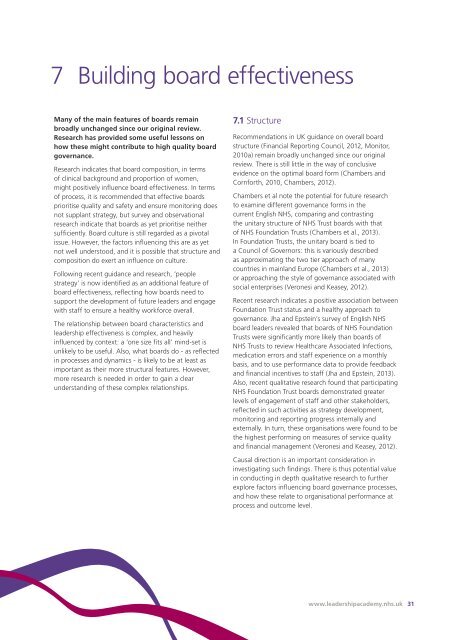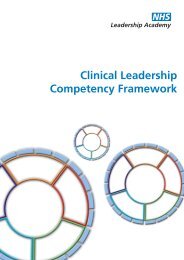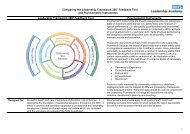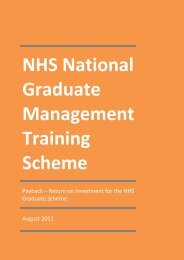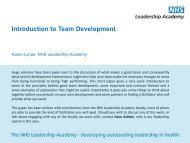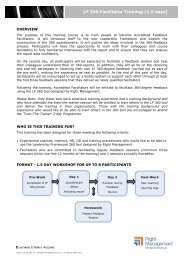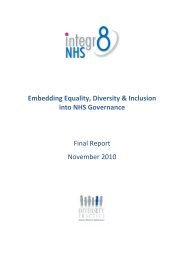Healthy NHS Board: a review of - NHS Leadership Academy
Healthy NHS Board: a review of - NHS Leadership Academy
Healthy NHS Board: a review of - NHS Leadership Academy
Create successful ePaper yourself
Turn your PDF publications into a flip-book with our unique Google optimized e-Paper software.
7 Building board effectiveness<br />
Many <strong>of</strong> the main features <strong>of</strong> boards remain<br />
broadly unchanged since our original <strong>review</strong>.<br />
Research has provided some useful lessons on<br />
how these might contribute to high quality board<br />
governance.<br />
Research indicates that board composition, in terms<br />
<strong>of</strong> clinical background and proportion <strong>of</strong> women,<br />
might positively influence board effectiveness. In terms<br />
<strong>of</strong> process, it is recommended that effective boards<br />
prioritise quality and safety and ensure monitoring does<br />
not supplant strategy, but survey and observational<br />
research indicate that boards as yet prioritise neither<br />
sufficiently. <strong>Board</strong> culture is still regarded as a pivotal<br />
issue. However, the factors influencing this are as yet<br />
not well understood, and it is possible that structure and<br />
composition do exert an influence on culture.<br />
Following recent guidance and research, ‘people<br />
strategy’ is now identified as an additional feature <strong>of</strong><br />
board effectiveness, reflecting how boards need to<br />
support the development <strong>of</strong> future leaders and engage<br />
with staff to ensure a healthy workforce overall.<br />
The relationship between board characteristics and<br />
leadership effectiveness is complex, and heavily<br />
influenced by context: a ‘one size fits all’ mind-set is<br />
unlikely to be useful. Also, what boards do - as reflected<br />
in processes and dynamics - is likely to be at least as<br />
important as their more structural features. However,<br />
more research is needed in order to gain a clear<br />
understanding <strong>of</strong> these complex relationships.<br />
7.1 Structure<br />
Recommendations in UK guidance on overall board<br />
structure (Financial Reporting Council, 2012, Monitor,<br />
2010a) remain broadly unchanged since our original<br />
<strong>review</strong>. There is still little in the way <strong>of</strong> conclusive<br />
evidence on the optimal board form (Chambers and<br />
Cornforth, 2010, Chambers, 2012).<br />
Chambers et al note the potential for future research<br />
to examine different governance forms in the<br />
current English <strong>NHS</strong>, comparing and contrasting<br />
the unitary structure <strong>of</strong> <strong>NHS</strong> Trust boards with that<br />
<strong>of</strong> <strong>NHS</strong> Foundation Trusts (Chambers et al., 2013).<br />
In Foundation Trusts, the unitary board is tied to<br />
a Council <strong>of</strong> Governors: this is variously described<br />
as approximating the two tier approach <strong>of</strong> many<br />
countries in mainland Europe (Chambers et al., 2013)<br />
or approaching the style <strong>of</strong> governance associated with<br />
social enterprises (Veronesi and Keasey, 2012).<br />
Recent research indicates a positive association between<br />
Foundation Trust status and a healthy approach to<br />
governance. Jha and Epstein’s survey <strong>of</strong> English <strong>NHS</strong><br />
board leaders revealed that boards <strong>of</strong> <strong>NHS</strong> Foundation<br />
Trusts were significantly more likely than boards <strong>of</strong><br />
<strong>NHS</strong> Trusts to <strong>review</strong> Healthcare Associated Infections,<br />
medication errors and staff experience on a monthly<br />
basis, and to use performance data to provide feedback<br />
and financial incentives to staff (Jha and Epstein, 2013).<br />
Also, recent qualitative research found that participating<br />
<strong>NHS</strong> Foundation Trust boards demonstrated greater<br />
levels <strong>of</strong> engagement <strong>of</strong> staff and other stakeholders,<br />
reflected in such activities as strategy development,<br />
monitoring and reporting progress internally and<br />
externally. In turn, these organisations were found to be<br />
the highest performing on measures <strong>of</strong> service quality<br />
and financial management (Veronesi and Keasey, 2012).<br />
Causal direction is an important consideration in<br />
investigating such findings. There is thus potential value<br />
in conducting in depth qualitative research to further<br />
explore factors influencing board governance processes,<br />
and how these relate to organisational performance at<br />
process and outcome level.<br />
www.leadershipacademy.nhs.uk 31


